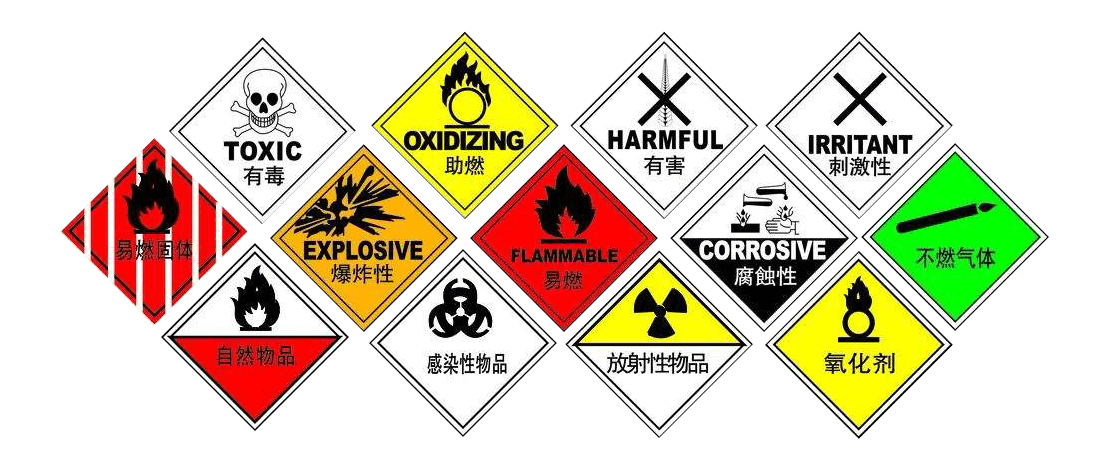Dangerous Goods Label
CLASS 1- EXPLOSIVES
Division 1.1 Substances and articles which have a mass explosion hazard
Division 1.2 Substances and articles which have a projection hazard but not a mass explosion hazard
Division 1.3 Substances and articles which have a fire hazard and either a minor blast hazard or a minor projection hazard or both
Division 1.4 Substances and articles which present no significant hazard; only a small hazard in the event of ignition or initiation during transport with any effects largely confined to the package
Division 1.5 Very insensitive substances which have a mass explosion hazard
Division 1.6 Extremely insensitive articles which do not have a mass explosion hazard
Class 2- Gases
Division 2.1 Flammable gas – gases which ignite on contact with an ignition source example acetylene, hydrogen.
Division 2.2 Non flammable gases – gases which are neither flammable nor poisonous example oxygen, nitrogen, neon.
Division 2.3 Poisonous gases – gases liable to cause death or serious injury to human health if inhaled example fluorine, chlorine, hydrogen cyanide
Class 3- Flammable liquids
Flammable liquids are defined by dangerous goods regulations as liquids, mixtures of liquids or liquids containing solids in solution or suspension which give off a flammable vapour (have a flash point) at temperatures of not more than 60-65°C, liquids offered for transport at temperatures at or above their flash point or substances transported at elevated temperatures in a liquid state and which give off a flammable vapour at a temperature at or below the maximum transport temperature.
Sub-Divisions
There are no subdivisions within Class 3, Flammable Liquids.
Class 4- Flammable solids
Division 4.1 Flammable solids which are easily ignited and readily combustible example nitrocellulose, magnesium, safety or strike-anywhere matches.
Division 4.2 Spontaneously combustible substances example aluminium alkyls, white phosphorus.
Division 4.3 Substances which emit a flammable gas when wet or react violently with water example sodium, calcium, potassium.
CLASS 5- OXIDIZING SUBSTANCES; ORGANIC PEROXIDES
Division 5.1 Oxidising agents other than organic peroxides example calcium hypochlorite, ammonium nitrate , hydrogen peroxide.
Division 5.2 Organic peroxides ,either in liquid or solid form example benzoyl peroxides, cumene hydroperoxide.
Class 6- Poisonous toxic and infectious substances
Division 6.1 Poisonous substances which are liable to cause death or serious injury to human health if inhaled, swallowed or by skin absorption example potassium cyanide, mercuric chloride, hydrofluoric acid.
Division 6.2 Biohazardous substances example virus cultures, pathology specimens, used intravenous needles.
CLASS 7- RADIOACTIVE MATERIAL
Dangerous goods regulations define radioactive material as any material containing radionuclides where both the activity concentration and the total activity exceeds certain pre-defined values. A radionuclide is an atom with an unstable nucleus and which consequently is subject to radioactive decay.
Sub-Divisions
There are no subdivisions within Class 7, Radioactive Material.
CLASS 8- CORROSIVES
Corrosives are substances which by chemical action degrade or disintegrate other materials upon contact.
Sub-Divisions
There are no subdivisions within Class 8, Corrosives.
CLASS 9 – MISCELLANEOUS DANGEROUS GOODS
Miscellaneous dangerous goods are substances and articles which during transport present a danger or hazard not covered by other classes. This class encompasses, but is not limited to, environmentally hazardous substances, substances that are transported at elevated temperatures, miscellaneous articles and substances, genetically modified organisms and micro-organisms and (depending on the method of transport) magnetized materials and aviation regulated substances.
Sub-Divisions
There are no subdivisions within Class 9, Miscellaneous Dangerous Goods.
